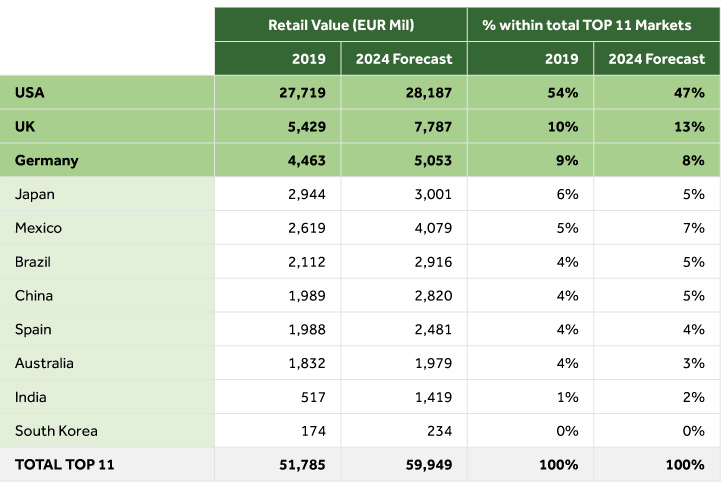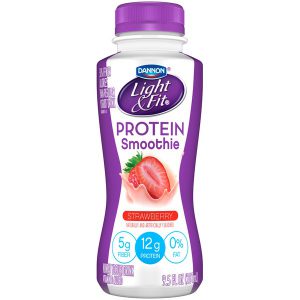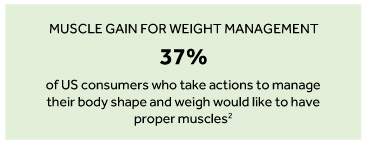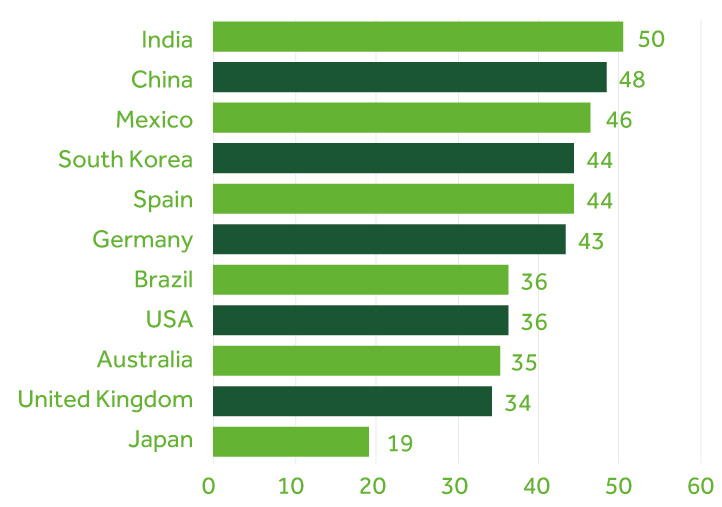2.2. Spotlight on weight management
INTRODUCTION
Obesity increasing worldwide
Health issues stemming from being overweight and obesity are a significant cause of distress for consumers, as well as governmental institutions since they can be associated with other health risks and diseases. These problems increase with higher consumption of sugary drinks and fast food.
Moreover, insufficient physical activity has become part of the common lifestyle and this in turn leads to sedentarism and overweight.

MARKET COMPARISON
Figure 2. Weight Management – Past and Future 5YR CAGR% (Compound annual growth rate) (Bubble size: Market retail value, Mil EUR).

Table 2. Weight Management

USA is by far the largest market in Weight Management (54% of the category). However, the category has been in decline in the USA and the downward trend is expected to continue in the future.
USA is followed by the UK and Germany. It is forecasted to grow by 3% points in the UK by 2024, whereas a drop by 1% point is expected in Germany during the forecast period.
Weight Management is relatively smaller in size in the rest of the markets.
A. Country Highlight – USA
 Meal replacements
Meal replacements
Increasing concern for weight loss and overall wellbeing have increased meal replacements in the US.
In the past, meal replacements were for those who wanted to limit calories or lose weight, nowadays since it has become such a trendy topic, consumers have altered the way they choose food and have increased sales of meal replacements, since it simplifies the eating process.
Expanded product offerings from the likes of Premier Protein and Soylent offer a specific calorie count, the majority of essential nutrients and vitamins, and come in a convenient on-the-go format.
B. Country Highlight – UK1
Over-the-counter (OTC) obesity and weight loss supplements are no longer a part of the plan for overweight UK consumers.
Solid eating regimens and wellness culture leading the pack in to accomplishing weight reduction. Influencers promoting OTC obesity and weight reduction supplements have been blamed for promoting unnatural ways of life and recommending items that may hurt as opposed to promote healthy weight loss.
Healthy eating regimens, and easy accessibility of utilitarian nourishments that are invigorated with protein or fiber, are developing as they are viewed as a healthy method to accomplish weight reduction goals.
Healthier choices for weight reduction: Meal replacements products.
Meal replacements have overcome weight loss supplements because they are considered a healthier and safer choice to fight against OTC obesity since they provide the essential nutrients, vitamins and minerals but are less caloric dense.
The 1:1 diet (Cambridge Diet) is based on replacing meals for low-caloric shakes and is stated as a healthy weight loss.
C. Country Highlight – Germany1
Germany’s main trend: Physically active lifestyle
Shared bike systems, gym plans and flexible working places have allowed this trend to increase, since people now have the power to schedule their day and also, their workout.
As everyone assumes, physical exercise is considered a more effective way to lose weight. However, products that can help to tackle weight problems in the short term are perceived as unhealthy.
Therefore, Germany is approaching a greener diet with more organic products and physically active exercises.

THE DIRECTION OF WEIGHT LOSS PRODUCT IS SHIFTING2
 While consumers still seem vulnerable to well-marketed, exaggerated slimming products, the trend seems to be moving in a more honest, more scientifically credible, holistic and long-term weight management direction that focuses on improving overall wellbeing.
While consumers still seem vulnerable to well-marketed, exaggerated slimming products, the trend seems to be moving in a more honest, more scientifically credible, holistic and long-term weight management direction that focuses on improving overall wellbeing.
Balancing nutrients (such as fiber and protein), improving product offerings based on people’s attribute preference and expanding weight loss ingredients’ credibility are a handful of the potential solutions that are proving to be valuable propositions for brands looking to take ground within the weight management space.
PROTEIN AND FIBER AS OPPORTUNITIES FOR THE WEIGHT-LOSS AREA
| PROTEIN | FIBER |
| According to Mintel, positioning high-protein products with muscle-building, weight management properties can be the key to weight loss brand success. | High fiber products can make high-satiety claims. Fiber’s potential is also that it is a natural ingredient and consumers are already aware of this. It can be used to make digestive claims. |

CONSUMER ATTITUDE TOWARDS WEIGHT MANAGEMENT
According to a research done by Mintel in the US in 2018, losing or maintaining weight is the third most motivating reason for eating healthy after General Wellbeing and Feeling good about one’s self3.
Another analysis done by the same company in the UK shows that 48% of 16+ adults agree that they would ideally like their diets to help them reach/maintain a healthy weight4.
Figure 3. “Please look at the following statements and tick all that apply: I actively monitor what I eat in order to manage my weight”.

Watch out for Asia Pacific in weight management5
According to Mintel GNDP (Global New Products Database), inspired by rising obesity across the world, the percentages of launches carrying a slimming claim remains low, at a mere 2%.
However, Asia Pacific’s share of global slimming product launches has increased by 9% points over the last five years. This region is forecasted to represent the fastest growth over the coming years due to rising disposable incomes, inactive lifestyles and the increasing rates of obesity and diabetes.
REALITY VERSUS ATTITUDES
The consumers in the top three markets for this category (USA, UK, Germany) are more likely to buy products for weight management than actively monitoring what they eat (Figure 2). Germans are doing a relatively better job in monitoring what they eat.
Consumers in India, China, Mexico, South Korea and Spain are relatively active in monitoring what they eat (Figure 3), however they don’t seem to buy products with weight management claims as much as the American, English and German consumers.
India shows interest both in monitoring their food and buying products to support it even though they buy very little at the moment.
REFERENCES
- Euromonitor.
- Mintel, Improving efficacy of weight loss functionality, 2019.
- Lightspeed/Mintel.
- Attitudes Towards Healthy Eating, Mintel, UK, 2020.
- Source: Mintel, GNPD.




